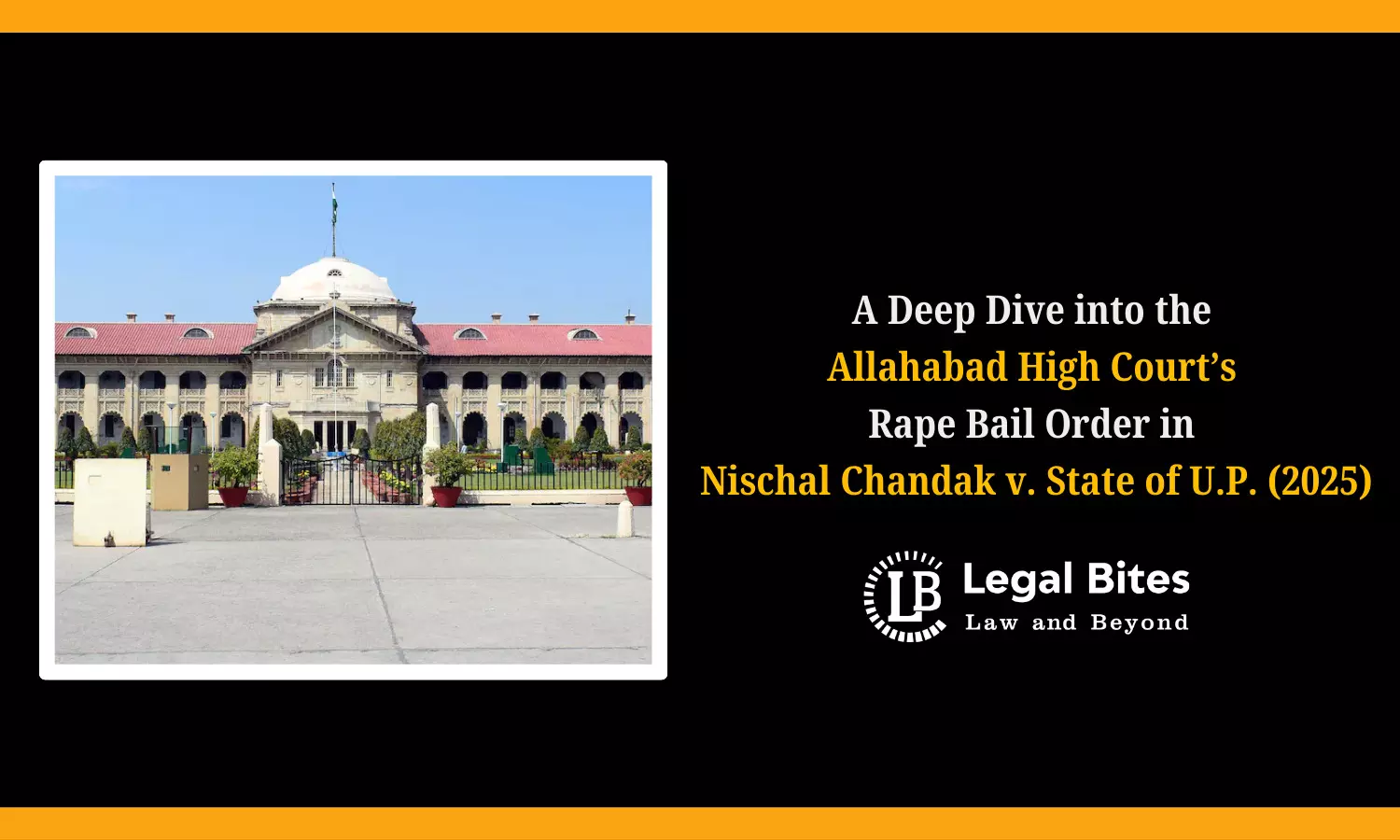A Deep Dive into the Allahabad High Court’s Rape Bail Order in Nischal Chandak v. State of U.P.(2025)
An analysis of the 2025 Allahabad High Court rape bail ruling, focusing on its legal reasoning and views on the victim's role.

In a controversial ruling that has sparked debate in legal circles, the Allahabad High Court granted bail to Nischal Chandak, the accused in a rape case under Section 64 of the Bharatiya Nyaya Sanhita (BNS), 2023. The Court’s observations, particularly those questioning the conduct of the victim and attributing partial responsibility to her, have raised serious concerns about the judiciary's approach toward sexual assault survivors.Title of the Case: Nischal Chandak v. State of...
In a controversial ruling that has sparked debate in legal circles, the Allahabad High Court granted bail to Nischal Chandak, the accused in a rape case under Section 64 of the Bharatiya Nyaya Sanhita (BNS), 2023. The Court’s observations, particularly those questioning the conduct of the victim and attributing partial responsibility to her, have raised serious concerns about the judiciary's approach toward sexual assault survivors.
Title of the Case: Nischal Chandak v. State of U.P.
Court: Allahabad High Court
Citation: Criminal Misc. Bail Application No. 1971 of 2025
Bench: Hon’ble Justice Sanjay Kumar Singh
Order Date: 11 March 2025
Provisions Involved: Section 64, Bharatiya Nyaya Sanhita, Section 483, BNSS, 2023 (Bail)
Background of the Case
The case revolves around a First Information Report (FIR) registered on 23rd September 2024, at Police Station Sector-126, Gautam Budh Nagar, under Section 64 of the BNS, 2023. The complainant, a postgraduate student, alleged that on the night of 21st September 2024, she was raped by the applicant after being taken to a flat in Gurugram under the pretense of rest.
According to the FIR, the complainant and her female friend had gone out with three male friends to "The Record Room Bar & Restaurant" in Delhi. During their time there, they reportedly consumed alcohol. The complainant stated that she became heavily intoxicated and was later persuaded by the applicant to accompany him to his home for rest. Instead, she alleged, the applicant took her to a relative’s flat in Essel Towers, Gurugram, where he sexually assaulted her twice.
The FIR mentions that she was held against her will and only managed to inform her friends the following morning. Upon learning about the assault, her friends reached the flat and took her for medical examination, following which a complaint was lodged.
Legal Framework
The applicant was charged under Section 64 of the Bharatiya Nyaya Sanhita, 2023, which deals with the offence of rape. He filed a bail application under Section 483 of the Bharatiya Nagarik Suraksha Sanhita, 2023.
Section 64 criminalizes non-consensual sexual intercourse and outlines situations in which consent is vitiated, including intoxication, coercion, and deceit. Section 483 provides procedural grounds for the grant of bail, empowering courts to consider the nature of the offence, the evidence presented, and the risk of absconding or tampering with evidence.
The Accused's Arguments
The bail plea, moved by Mr. Balbir Singh and argued by Senior Advocate Mr. Vinay Saran, raised multiple points:
- Consensual Relationship Alleged: The defense argued that the victim was a major and acted voluntarily. She chose to drink at the bar and willingly agreed to accompany the applicant.
- No Criminal History: The applicant had no prior criminal record and had been in jail since December 2024.
- No Risk of Tampering: The defense stressed that there was no risk of the accused fleeing justice or tampering with evidence.
- Medical Report Inconclusive: While the medical examination indicated a torn hymen, it did not conclusively prove sexual assault. There was no categorical statement from the doctor about the incident being non-consensual.
State's Position
The Additional Government Advocate opposed the bail application by highlighting the gravity of the allegations and the content of the FIR. However, he did not dispute the factual matrix presented by the defense, particularly regarding the consensual drinking and movement of the victim with the accused.
Observations of the Court
The single-judge bench of Justice Sanjay Kumar Singh took a controversial turn in interpreting the events. Key observations include:
- Adulthood and Consent: The Court noted that both the accused and the victim were adults. The victim, being a postgraduate student, was deemed mature enough to understand the implications of her actions.
- Voluntary Participation: The Court found it significant that the victim voluntarily stayed at the bar with male friends until 3 a.m. and subsequently agreed to leave with the applicant.
- “Invited Trouble” Remark: The Court controversially remarked: “Even if the allegation of the victim is accepted as true, then it can also be concluded that she herself invited trouble and was also responsible for the same.”
- Nature of Allegations: The Court, after examining the FIR and medical report, opined that the matter might involve consensual physical intimacy rather than coercive sexual assault, making it a fit case for bail.
Bail Order and Conditions
The Court allowed the bail application on 11th March 2025, setting the following conditions:
- The applicant must cooperate with the trial and attend court regularly.
- He must not threaten or influence any witness or tamper with evidence.
- He must not engage in any further criminal activity.
- The sureties provided must be verified by the trial court before release.
- The Court also clarified that the observations made were limited to the bail application and would not influence the outcome of the trial.
Conclusion
The Allahabad High Court’s bail order in Nischal Chandak v. State of U.P. has reignited a critical conversation on how rape cases are interpreted and narrated within the judicial system. While the procedural grant of bail may be justifiable, the attribution of responsibility to the victim within the reasoning reflects a deeper problem of ingrained societal biases creeping into legal discourse.
As India moves forward under its new criminal codes, the case serves as a reminder of the importance of sensitivity, neutrality, and legal precision—not just in what is decided, but in how it is articulated by the courts.

Apurva Neel
I am a Research Associate and Editor at Legal Bites with an LL.M. specialization in Corporate and Commercial Laws from Amity University, Mumbai. I have put my best efforts into presenting socio-legal aspects of society through various seminars, conferences etc. I keep refining content as I am an ardent writer, and palpably law has got multi-dimensional aspect, so I passionately try to explore ahead.
